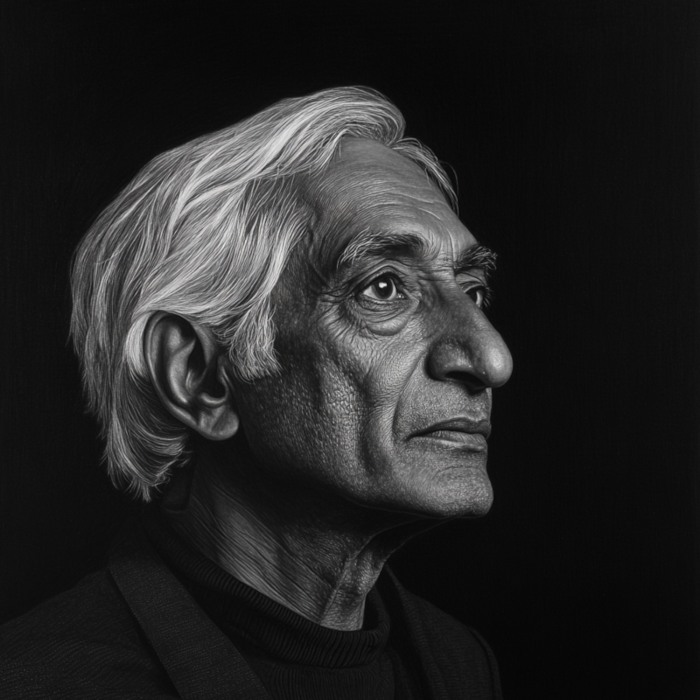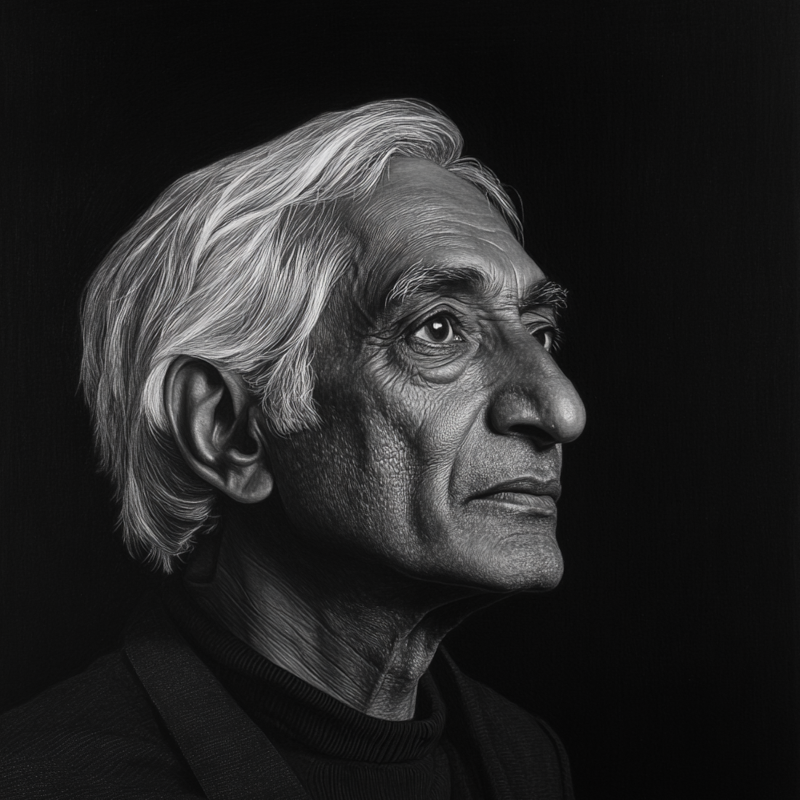


Jiddu Krishnamurti (1895–1986) was an influential Indian philosopher, speaker, and writer, known for his teachings on psychological revolution, the nature of the mind, and the pursuit of truth independent of organized religion, politics, and tradition. His work emphasized the importance of self-inquiry and the understanding of the mind in achieving personal transformation and global peace.
In 1909, at the age of 14, Krishnamurti was discovered by Charles Webster Leadbeater, a prominent member of the Theosophical Society, who believed that Krishnamurti was the "World Teacher" whose coming the Society had predicted. He was taken under the wing of Annie Besant, the President of the Theosophical Society, and was groomed for this role.
Krishnamurti was brought to England and educated in the West, where he was introduced to Theosophy, a spiritual movement that aimed to explore the deeper aspects of life and reality. In 1911, the Order of the Star in the East was formed with Krishnamurti as its head, intended to prepare the world for the arrival of the "World Teacher."
However, in 1929, Krishnamurti made a dramatic break with the Theosophical Society and the Order of the Star. In a famous speech, he dissolved the Order, declaring that truth is a pathless land and cannot be approached by any organization, creed, or dogma. He emphasized that individuals must seek truth independently, without relying on external authorities.
Krishnamurti's teachings are centered on the following key themes:
Self-Inquiry: He taught that self-awareness and understanding the workings of one's own mind are essential for personal transformation. He encouraged people to observe their thoughts, emotions, and behaviors without judgment or analysis, to discover the underlying patterns that drive them.
Freedom from Conditioning: Krishnamurti believed that human beings are deeply conditioned by their environment, culture, religion, and education. He advocated for freeing oneself from this conditioning to achieve true understanding and clarity.
The Nature of the Mind: Krishnamurti explored the nature of thought and consciousness, emphasizing the importance of quieting the mind to perceive reality directly. He often spoke about the limitations of thought in understanding life and advocated for a state of choiceless awareness.
Relationships and Society: He explored the nature of relationships, pointing out that true relationship can only exist when there is no image-making or projection of past experiences onto others. He also discussed the implications of individual transformation on society, arguing that a change in the individual is necessary for a change in the world.
Education: Krishnamurti placed great importance on education as a means of nurturing holistic development rather than merely imparting knowledge. He founded several schools around the world, including the Rishi Valley School in India and the Brockwood Park School in England, which focus on fostering inquiry, awareness, and a deeper understanding of life.
Krishnamurti spent much of his life traveling the world, giving talks and engaging in dialogues with individuals and groups on a wide range of topics. He spoke at length about the need for global consciousness and the dangers of nationalism, organized religion, and other divisive ideologies.
Unlike many spiritual teachers, Krishnamurti did not establish a following or a religion. He insisted that his teachings should not be accepted on authority but should be examined and understood personally by each individual.
Jiddu Krishnamurti passed away on February 17, 1986, in Ojai, California, where he had spent much of his later years. He left behind a vast body of work, including numerous books, recorded talks, and dialogues, which continue to be studied and revered by people around the world.
Krishnamurti's influence extends beyond traditional spiritual or philosophical circles. His ideas have impacted education, psychology, and the broader discourse on human consciousness. His teachings continue to resonate with those seeking to understand the complexities of the mind and the challenges of living in a fragmented world.
Several foundations, such as the Krishnamurti Foundation Trust in England and the Krishnamurti Foundation of America, continue to preserve and disseminate his work. His schools remain active, embodying his vision of education that nurtures the whole person.
Krishnamurti's legacy is one of independence, self-reliance, and an unwavering commitment to the pursuit of truth. His life and work remain an enduring source of inspiration for those seeking to explore the depths of human consciousness and achieve a deeper understanding of themselves and the world.

We use cookies
We use cookies and other tracking technologies to improve your browsing experience on our website, to show you personalized content and targeted ads, to analyze our website traffic, and to understand where our visitors are coming from. Privacy Policy.